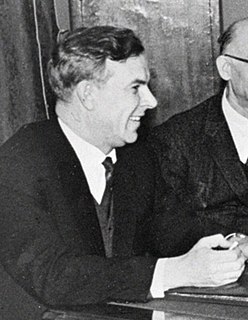A Quote by Stellan Skarsgard
Any society that starts forbidding certain words or expressions is a society you should be wary about, whether it's the KGB or social consensus that enforces it.
Related Quotes
ONE MORE CHNCE. Words that my mother heard, more than once. Words that women debate. Whether you CAN forgive and whether you SHOULD trust. I think of all the judgment from society, friends, and family, the overwhelming consensus seeming to be that you should not grant someone who betrayed you a second chance. That you should do everything you can to keep the knife out of your back, and to protect your heart and pride. Cowards give second chances. Fools give second chances. And I am no coward, no fool.
What I call middle-class society is any society that becomes rigidified in predetermined forms, forbidding all evolution, all gains, all progress, all discovery. I call middle-class a closed society in which life has no taste, in which the air is tainted, in which ideas and men are corrupt. And I think that a man who takes a stand against this death is in a sense a revolutionary.
KGB was inseparable part of the Soviet Union and the whole structure of the Soviet society. We believe that the achievements of the Soviet Union and of the Soviet society, it's main achievements until the split in 1991, it was at the same time the main achievements of the KGB, because it was working for the same cause.
Human envy is certainly not one of the sources of discontent that a free society can eliminate. It is probably one of the essential conditions for the preservation of such a society that we do not countenance envy, not sanction its demands by camouflaging it as social justice, but treat it, in the words of John Stuart Mill, as 'the most anti-social and evil of all passions.'
If a society takes it upon itself to prescribe and proscribe certain streams of belief - to prohibit certain less-favored strains of conscience - it may be the non-believer who is among the first to be condemned. A coercive monopoly of belief threatens everyone, whether we are talking about those who search the philosophies of men or follow the words of God.
You grow up and recognize that in any educated secular society, there's no excuse for ignorance. You have to recognize in yourself, and challenge yourself, that if you see racism or homophobia or misogyny in a secular society, as a member of that society, you should challenge it. You owe it to the betterment of society.
In principle as a philosophy, a model of organising society, Communism has to be respected. As regards the use of certain methods to advance social justice and greater regulation by the state, there are certain methods that are useful. What we need is a new society, a new civilization and convergence of all that is best in both [Communism and Capitalism]
There is a very broad theory that society gets the right to hang, as the individual gets the right to defend himself. Suppose she does; there are certain principles which limit this right. Society has got the murderer within four walls; he never can do any more harm. Has society any need to take that man's life to protect itself? If any society has only the right that the individual has, she has no right to inflict the penalty of death, because she can effectually restrain the individual from ever again committing his offence.
[T]here are, at bottom, basically two ways to order social affairs, Coercively, through the mechanisms of the state - what we can call political society. And voluntarily, through the private interaction of individuals and associations - what we can call civil society. ... In a civil society, you make the decision. In a political society, someone else does. ... Civil society is based on reason, eloquence, and persuasion, which is to say voluntarism. Political society, on the other hand, is based on force.
In its pursuit of justice for a segment of society, in disregard of the consequences for society as a whole, what is called 'social justice' might more accurately be called anti-social justice, since what consistently gets ignored or dismissed are precisely the costs to society. Such a conception of justice seeks to correct, not only biased or discriminatory acts by individuals or by social institutions, but unmerited disadvantages in general, from whatever source they may arise.




































